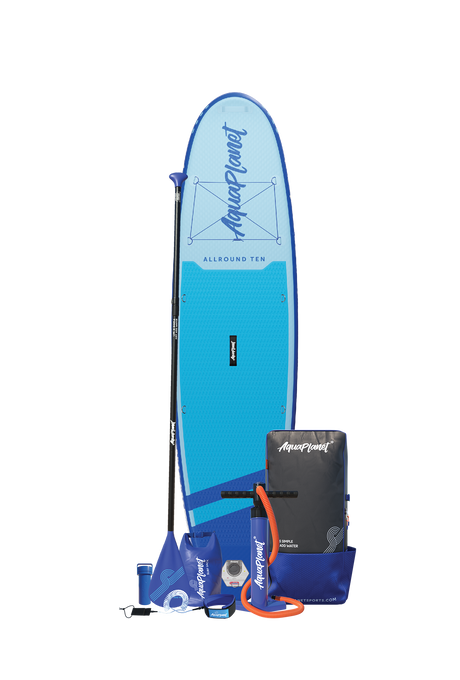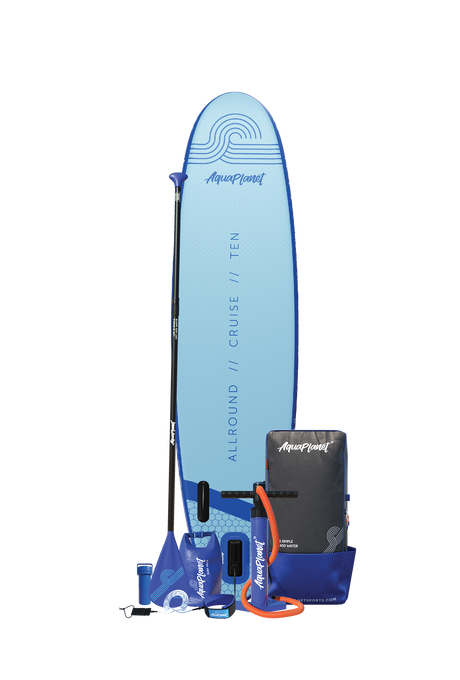If you’ve decided that you’d like to learn a new water sport this spring/summer, there are two obvious options: paddle boarding or surf paddle boarding.
While both involve standing on a board and using a paddle, they differ in terms of board shape, water conditions, skill level and fitness requirements. So, before you commit to one or the other and go out and buy all the kit, here’s what you need to know:
Paddle boarding:

Paddle boarding, also known as stand-up paddle boarding (SUP), involves standing on a wider, more stable board and using a paddle to propel yourself through the water.
One of the brilliant things about paddle boarding is that it can be done on a variety of bodies of water, from lakes and rivers to bays and oceans. So, if you don’t live particularly close to the sea, it’s not a problem.
Another key benefit of paddle boarding is that it's easy to learn. Even if you're a beginner, you can quickly get the hang of it and within no time, you’ll be out on the water with a fair degree of confidence.
Although SUP is a low-impact activity, it provides a great full-body workout, as it engages your core, arms, back and legs. It's a great way to improve your balance, strengthen your muscles – plus it can do wonders for your mental health.
There are different types of paddle boards available, including all-around, touring, racing and yoga boards. All-around boards are the most versatile and suitable for beginners. They are wider and more stable, making them easier to balance on.
Touring boards are longer and faster, designed for longer distances and more challenging conditions. Racing boards are even longer and narrower, built for speed and agility. Yoga boards are wider and more stable, designed for practicing yoga on the water.
If you’re a little unsure on what board will best suit your needs, not to worry – Aquaplanet can you find your perfect SUP in just 30 seconds. Just tell us how you’d like to use your paddle board and we’ll do the rest!
Surf paddle boarding:

Surf paddle boarding, also known as SUP surfing, involves standing on a narrower, more agile board and using a paddle to navigate ocean waves.
Surf paddle boarding requires more skill and experience than regular paddle boarding, as it involves dealing with waves, currents and wind – all of which can be unpredictable beasts! It's a more physically demanding activity, requiring strength, balance and quick reflexes.
When you’re out there riding the waves, it can be quite the adrenaline rush. If you get good at it, it provides a great sense of accomplishment. If you’ve spent a day SUP surfing, your body knows about it – every muscle will be used as you try to keep yourself upright as the water attempts to knock you off your board.
There are different types of surf paddle boards available including shortboards, longboards and hybrid boards.
Shortboards are, as the name would suggest, narrower and more agile, allowing for quick turns and sharp movements. Longboards are wider and more stable, designed for catching small to medium-sized waves. Hybrid boards are a mix of both, offering stability and manoeuvrability.
Which one is right for you?

Only you can answer that really – but we’d suggest that the following three factors will help you make your mind up:
Proximity to the sea: Surf paddle boarding is all about catching some waves, while paddle boarding can be done on any body of water – and everyone has a local river they can paddle down.
Skill level: Paddle boarding is generally easier to learn and requires less skill than surf paddle boarding. It can take months with a skilled instructor to become proficient on a surf board – it usually takes about half the time to get upright on a paddle board.
Health benefits: Surf paddle board will have more physical health benefits, but if mental health benefits are just as important to you, consider what paddle boarding could do for you – whether you’re doing some SUP yoga or just going for a leisurely paddle, it can bring a real sense of tranquillity.
Before stepping aboard your SUP, check out our top tips for beginners.
Happy paddling!









